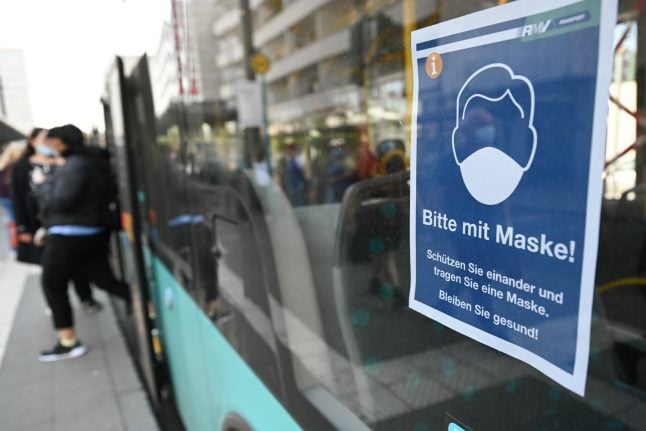Everyone in Germany is required by law to wear a covering over their face and mouth while on public transport as well as in shops.
On Wednesday police in the city of Darmstadt in Hesse said a bus driver was struck by a passenger and injured after she pointed out the rules.
The female passenger, said to be between 20 and 30-years-old entered the bus with three men and child. No members of the group were covering their mouths and noses.
The bus driver warned the group repeatedly to comply with this regulation. However, police said the group insulted the driver.
At the end of the journey, the suspect then entered the area next to the driver and struck her several times.
The group then fled the scene.
Police are searching for the suspect and have asked witnesses to come forward.
It's the latest in a series of violent attacks on bus drivers. In England last week a driver was attacked for not allowing someone on the bus because they were not wearing a mask.
Earlier this month, a bus driver in France died after being beaten up by passengers who refused to wear face masks.
Meanwhile, several teenagers attacked police and bus drivers recently during a mask check in Friborg, Switzerland, leaving two officers injured.
Bavaria sets up test centres in railway stations and on motorways
Coronavirus test stations for motorists at the Bavarian border as well as for rail travellers at Munich and Nuremberg main stations are scheduled to go into operation on Thursday.
According to the health ministry in Munich, interim test centres are planned near the border crossings Kiefersfelden, Walserberg and Pocking at the rest stops Inntal-Ost and Heuberg, Hochfelln-Nord and Donautal-Ost. The Bavarian state government had decided on Tuesday to set up the test centres.
READ ALSO: Bavaria to offer free coronavirus tests at train stations and motorways
Police break up parties in Berlin
And in Berlin, hundreds of people flouted coronavirus rules by partying in city parks. Up to 1,200 people gathered in the Hasenheide park in Neukölln on Tuesday, according to police.
Police said music was played loudly and people were not following the required 1.5 metre distance rule.
In Volkspark Friedrichshain, about 250 young people gathered on Tuesday night to drink alcohol. Police said bottles were thrown at officers when they tried to break up the gathering.



 Please whitelist us to continue reading.
Please whitelist us to continue reading.
It’s fair to say anyone who attacks bus drivers gets a solid kicking right? Mask or not.